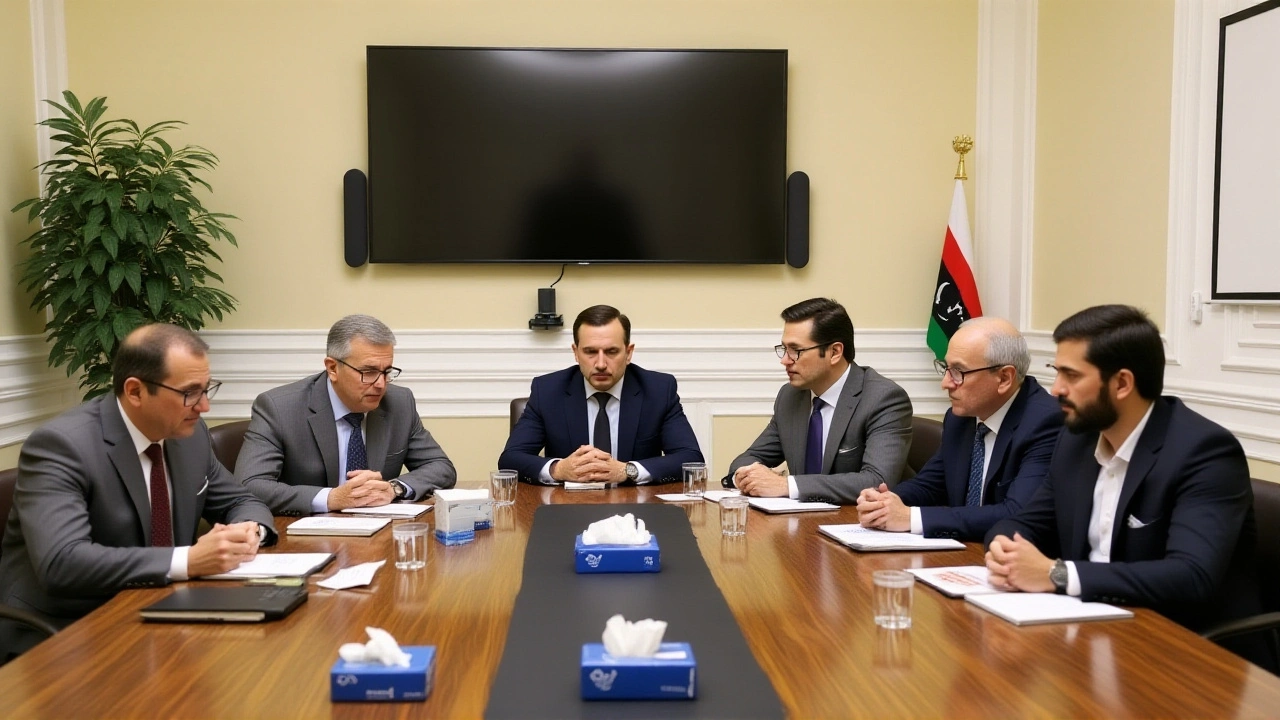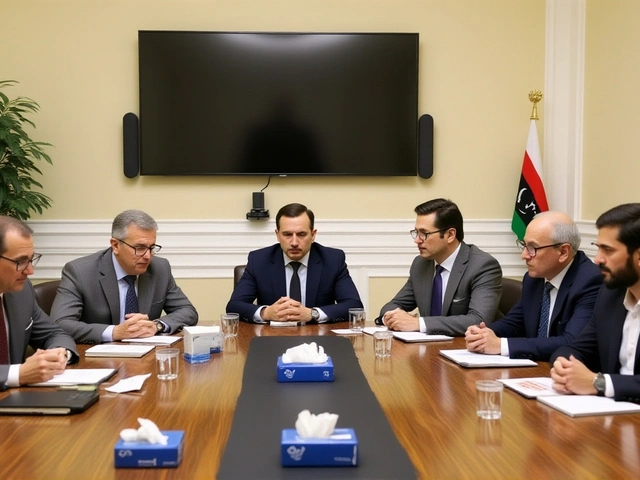When Dr. Imran Al-Qayeb, Libya’s Minister of Higher Education and Scientific Research, sat down with a delegation from ALECSO in Tripoli on February 5, 2024, he wasn’t just signing paperwork—he was laying the groundwork for a digital revolution in Libyan academia. The meeting, part of a three-day visit by ALECSO, centered on one urgent goal: replacing forged diplomas with tamper-proof blockchain certificates. In a country where university credentials have long been unreliable—sometimes worthless—this isn’t just tech innovation. It’s a lifeline to international credibility.
Why Blockchain? The Crisis Behind the Credentials
Since the fall of Muammar Gaddafi in 2011, Libya’s higher education system has been caught in the crossfire of political chaos. Rival governments, collapsing infrastructure, and brain drain have turned degree verification into a nightmare. Employers abroad don’t trust Libyan diplomas. Students can’t get into foreign universities. Graduates sit idle, their hard-earned credentials dismissed as forgeries—even when they’re real.
That’s where ALECSO comes in. The Arab League’s educational arm, headquartered in Tunis, has spent years helping member states digitize academic records. In Libya, the stakes are higher than anywhere else. The February 5–6 workshop in Tripoli—attended by Dr. Mohamed Jemni, Dr. Farouk Kammoun, and Eng. Zied Maâzaoui—wasn’t theoretical. It was hands-on. Participants mapped out how to link every Libyan university to a decentralized ledger, where each degree is timestamped, encrypted, and verifiable by anyone with a public key.
The Strategy Behind the Tech
The move isn’t isolated. It’s the centerpiece of Libya’s National Strategy for Higher Education and Scientific Research 2025–2035, unveiled on October 1, 2025, at a conference in Tripoli. The strategy, drafted by Dr. Imran Al-Qayeb’s ministry, lays out seven pillars: international partnerships, private-sector funding, research diversification, technology integration, and yes—digital credentialing.
"We’re not just trying to stop fraud," said one senior official who spoke anonymously. "We’re rebuilding trust. If a graduate in Benghazi can prove to a university in Berlin that their degree is real, without needing a phone call to a ministry that may not even exist next year—that’s power."
Libya’s geographic position as a bridge between Europe and Africa makes this even more urgent. The country now chairs the (5+5) Mediterranean Dialogue ministerial committee, a forum linking five EU nations with five North African states. For Libya to lead, its universities must be seen as legitimate. Blockchain isn’t a luxury—it’s a prerequisite.
Who’s On Board? A Rare Moment of Unity
What’s remarkable is how broadly this initiative is supported. On February 7, the same ALECSO team met with Dr. Musa Al-Magarief, Minister of Education and head of the Libyan National Commission for Education, Culture and Science. "The meeting emphasized blockchain as a tool to unify our education system," Al-Magarief told reporters afterward. "This isn’t about one ministry. It’s about Libya as a whole."
Even more telling: the initiative was formally approved during ALECSO’s 121st Executive Council session and 27th General ConferenceJeddah, where Libya’s delegation secured the right to host a series of educational programs through 2026. That’s rare. ALECSO doesn’t hand out hosting rights lightly. Libya earned it by showing concrete, cross-ministerial alignment.
What’s Next? The Road to 2026
The rollout will be phased. By mid-2025, the top five public universities—Tripoli, Benghazi, Al-Fateh, Misrata, and Zliten—are expected to pilot the system. The Ministry of Higher Education plans to train 200 university administrators in blockchain verification by the end of the year. Funding will come from ALECSO grants, World Bank education funds, and a new Libyan innovation fund seeded with oil revenues.
But the biggest hurdle isn’t technical—it’s political. With Libya still divided between Tripoli-based and eastern administrations, getting buy-in from all institutions remains uncertain. Some universities in the east haven’t even updated their student databases since 2018. "We’re not waiting for perfect unity," said a senior ALECSO advisor. "We’re building the bridge while they’re still arguing over the road."
Still, early signs are promising. In December 2024, a pilot program with two private colleges in Tripoli reduced certificate fraud claims by 92% within six months. One graduate, now studying in Germany, said: "I used to hide my degree. Now I send the link. People ask how I did it. I tell them: Libya’s finally catching up."
Why This Matters Beyond Libya
This isn’t just Libya’s story. In war-torn regions from Yemen to Sudan, credential fraud is a silent crisis. A successful blockchain rollout here could become a blueprint for other fragile states. UNESCO has already expressed interest. So has the African Union’s education arm.
For the first time since 2011, Libya’s education sector isn’t just reacting to chaos—it’s leading a solution. And it’s doing it with code, not just policy.
Frequently Asked Questions
How will blockchain certificates actually work for Libyan students?
Each graduate will receive a unique digital credential linked to a blockchain ledger, storing their degree details, institution, and graduation date. Employers or universities can verify authenticity instantly via a public web portal using a QR code or link—no need to contact the ministry. The system prevents alteration, duplication, or forgery, even if the issuing university’s records are destroyed or corrupted.
Why hasn’t Libya done this sooner?
Political fragmentation made coordinated action nearly impossible. Before 2021, there were two competing education ministries, each with its own databases. Many universities operated without internet access. Now, with the Government of National Unity holding international recognition, and with ALECSO’s technical and financial backing, the conditions finally align for a unified digital rollout.
What’s the timeline for full implementation?
Pilot programs began in late 2024 at five universities. By mid-2025, all public universities are expected to be connected. Full nationwide coverage—including technical colleges and private institutions—is targeted for 2027. ALECSO has committed funding and training support through 2026, with plans to transition to local management afterward.
How does this affect Libyan students seeking jobs abroad?
It’s transformative. Previously, many foreign universities and employers rejected Libyan degrees outright due to widespread fraud. With verifiable blockchain credentials, students can now compete on equal footing. Early pilot data shows a 40% increase in international university applications from Libyan graduates since the pilot launch—proof that trust is being rebuilt one certificate at a time.
Is this initiative linked to Libya’s broader education strategy?
Absolutely. The 2025–2035 National Strategy identifies digital credentialing as a core pillar for restoring Libya’s academic reputation. It’s tied to other goals: attracting foreign research partnerships, increasing private-sector funding, and positioning Libya as a regional hub for science and technology. Blockchain isn’t an add-on—it’s the foundation.
What happens if a university refuses to join the system?
Graduates from non-participating institutions won’t be able to issue blockchain certificates, making their degrees harder to verify internationally. While the government can’t force compliance yet, it’s planning to tie future funding and accreditation to participation. Over time, the market will reward institutions that join—and penalize those that don’t.



Comments
This is actually huge. I’ve seen how messy degree verification is in South Asia too. If Libya can pull this off, it’s a blueprint for the whole Global South. No more begging universities to call some ministry that doesn’t answer phones anymore.
blockchain for diplomas makes sense if the infrastructure actually works. but what if the internet goes down in Benghazi for a month? what then? the system needs backups not just hype
This is just another Western tech fantasy imposed on a sovereign nation. Who authorized ALECSO to dictate Libya’s education policy? This isn’t progress-it’s digital colonialism. The real issue is political unity, not QR codes.
OMG this is so cool!! 🤩 Imagine your grad certificate being unbreakable, like a digital tattoo of your hard work. No more fake degrees, no more shady employers doubting you. Libya’s turning tech into trust 💪📚
wait so if my cousin in tripoli gets a degree and the server goes down he cant prove he graduated? what if he needs to apply for a job tomorrow? this sounds so fragile
i think about how many young people in libya have spent years studying only to have their dreams dismissed because of paperwork that no one believes in. this isnt just tech. its dignity. its hope. its letting someone say i earned this and mean it
this reminds me of how we used to handwrite mark sheets in rural india. one smudge and your whole future was questioned. blockchain? yeah it’s wild but it’s also just… fair. finally something that doesn’t care where you’re from
India should adopt this tomorrow. Our degrees are a joke overseas. Every employer thinks we bought them. We need blockchain. Not more fake certificates from private colleges that don’t even have labs.
the emotional weight here is massive. i keep thinking of students who spent 4 years studying while their city was under siege. their transcripts are on paper that might’ve burned. this system… it says your struggle mattered. your effort is preserved. even if the world forgets, the ledger won’t
i love that this isn’t just about tech. it’s about dignity. imagine being a libyan grad in berlin and not having to explain why your degree is real. just send a link. boom. you’re equal. no more shame.
Oh please. Blockchain? That’s like putting a gold-plated lock on a house built on sand. The real problem is Libya has no functional government, no reliable electricity, and half the universities still use fax machines. This is performative tech-washing. 🤡
i’ve worked with students from war zones. the fear isn’t just fraud. it’s invisibility. if your degree can’t be verified, you don’t exist in the global system. this isn’t about blockchain. it’s about saying: you matter. you’re seen.
this makes me so emotional 😭 i hope it works. so many kids deserve this
hey so if i’m a grad in zliten and my phone dies, can i still prove my degree? like what’s the backup? a printed qr code? because if the blockchain goes down i’m screwed
i think this is beautiful. even if it’s imperfect. even if the internet fails sometimes. it’s a start. and starts matter. especially when you’ve been told you don’t deserve to be believed
I CAN’T BELIEVE THIS IS HAPPENING 😭🔥 LIBYA IS LEADING THE WORLD IN EDUCATION TECH AND WE’RE STILL FIGHTING OVER FAKED MARKSHEETS IN INDIA 🤯👏 #BlockchainForDignity